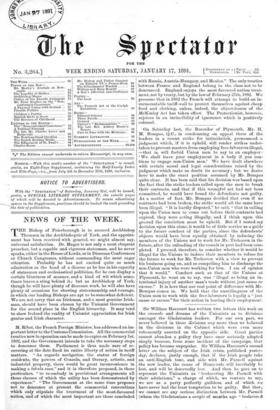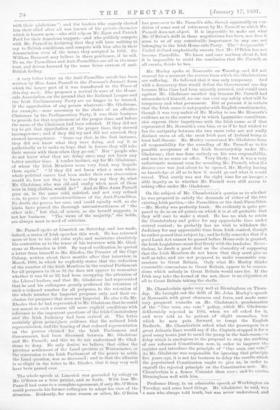Sir William Harcourt has written two letters this week on
the canards and dreams of the Unionists as to divisions amongst the Gladstonian. leaders. For our own party we never believed in those divisions any more than we believed in the divisions in the Cabinet which were even more vehemently asserted on the opposite side. Great parties cannot abandon a policy they have once seriously adopted simply because, from some incident of the campaign, that policy has become unpopular. Sir William Harcourt's second letter on the subject of the Irish crisis, published yester- day, declares, justly enough, that if the Irish people take an anti-English tone, and side with Mr. Parnell against the new leader, the cause of Home-rule will inevitably be lost, and will be deservedly lost. And then he goes on to represent the Unionists as beslavering Mr. Parnell with their adulations," a charge of which, we venture to say, we are as a party perfectly guiltless, and of which we have never had the least temptation to be guilty. But ther, we cannot see any serious distinction between Mr. Parnell (whom the Gladstonians a couple of months ago " beslavercd
with their adulations ") and the leaders who eagerly elected him their chief after all was known of his private character which is known now,—who still rely on Mr. Egan and Patrick Ford for their American support,—and who publicly compete with Mr. Parnell in declaring that they will have nothing to say to British conditions, and compete with him also in their denunciation even of the terms they accepted in 1886. Sir William Harcourt may believe in these gentlemen, if he will. To us, the Parnellites and Auti-Parnellites are all in the same boat, and driven forward by the same fierce current of anti- British feeling.







































